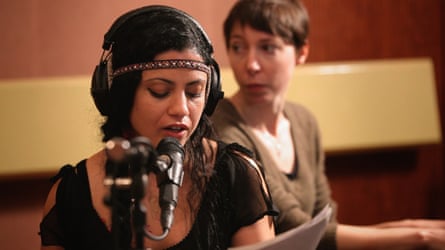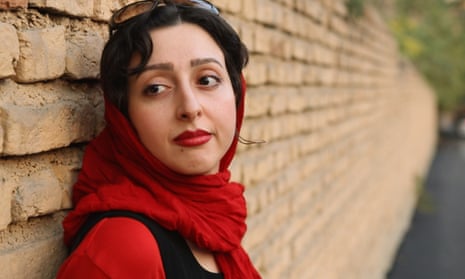Three years ago, the Iranian singer and composer Sara Najafi came up with the idea of hosting a concert in Tehran, her hometown. It was a plan so audacious, it seemed slightly nuts. The concert would be “a festival of the female voice” featuring solo singers – not just Iranians, but artists from France and Tunisia, too. Nothing like it had been attempted in Iran for 35 years: after the Islamic Revolution of 1979, women were banned from singing solo in public.
What’s more, Sara was inspired by the Green Movement, which grew out of the mass protests at Iran’s 2009 presidential election result. “It brought me to a new idea of music,” she says. “Basically, I wanted to make music for that movement.” Some choices of performer seem to have been designed to provoke the authorities, not least Emel Mathlouthi, the Tunisian singer whose song Kelmti Horra became a protest anthem during the Arab Spring.
Sara’s brother, the film-maker Ayat Najafi, offered to help organise the show and make a documentary about it, but his presence proved a mixed blessing. Based in Germany, he says he “wasn’t that welcome” in Iran, as a result of his 2008 documentary Football Under Cover, about an attempt to stage the first female soccer match in Iranian history. He was forced to shoot covertly, using a small camera. During Sara’s many visits to the Iranian Ministry of Culture, he couldn’t shoot at all – instead, while pleading her case, his sister wore a wire to record conversations. “That’s a good thing about a hijab,” he says. “You can hide a microphone in it. For the first time, we could use the headscarf in a positive way.”
What happened over the ensuing months is captured in No Land’s Song, a film that weaves a history of female singers in pre-revolutionary Iran (including the exceptionally ballsy Qamar-ol-Moluk Vaziri, who in 1924 became the first woman in Iran to perform without a hijab in front of men) around Sara’s struggle to get her gig off the ground.
The film is often drily funny: Sara’s mordant expression as she listens to an Islamic scholar explain why a group of women singing together can’t inflame men’s desires, but a solo female singer can, via an extended metaphor involving cheese; the exasperation of the Iranian musicians when their French counterparts appear to be scared off from coming to Tehran by the worsening situation in Syria (“Let’s scare them more when they arrive. Turn up late to the rehearsals, shout ‘Allahu Akbar!’ and let off an explosion”).
Occasionally, it’s hugely depressing. It depicts a society not just fearful of the authorities (a street-seller repeatedly insists he has no CDs by the Iranian singer Googoosh until he’s certain Sara isn’t in the secret police), but also struggling against Kafka-esque bureacracy. “Does anything have a clear answer in this country?” demands a government official during one of Sara’s meetings at the ministry. “A lot of things have no reason.”
Still, Sara keeps at it, navigating her way through endless pettifogging about how many women can sing on stage, at what volume, and whether they can move their bodies while singing. When the government refuses to issue the foreign musicians with work permits, they contemplate arriving as tourists and playing anyway – before the 2013 election ushers in the more moderate Hassan Rouhani as president and the visas are suddenly issued. For all her tenacity, Sara says there were times when she thought the plan was doomed. “After every meeting at the ministry, I said, ‘OK, it won’t happen.’ But then she’d have a meeting with her Iranian singers – some old enough to have performed before the revolution, others too young to remember a time when women were allowed to sing at all – and decide to fight on.

Even after the visas were issued, the government retracted permission for the show, demanding the musicians perform only “a workshop” in their rehearsal studio before a tiny audience from “the arts scene”. They only relented when the French musicians threatened to go home without performing. “They didn’t want to give a bad impression to foreigners,” says Ayat. “It was right after the election, and the new government really wanted to present a new side to the world.”
Meanwhile, Sara was besieged with threats. “There were two kinds. First, there are two very conservative news agencies, one linked to the militia, the other very close to the former president Ahmadinejad. Both said, ‘Look, they are planning a revolution in Iran – let’s stop them.’ There were telephone calls, we don’t know who from, but they definitely belonged to those kind of people. And then there were people from the ministry saying, ‘Look, we are under pressure from the right wing, what are you doing? They have brought their water-cannons and they are ready.’ So there was direct and indirect pressure.”
Nevertheless, the show went ahead – and, judging from the footage in No Land’s Song, it looks like the authorities’ worst nightmare. The music is utterly spellbinding. In full flight, with voices and traditional instruments soaring over acoustic guitars and a French drummer playing in a distinctly jazz-influenced style, one singer after another gets up and performs what sounds like a call to arms: “Get involved! Take risks! Destroy the house of tyranny!”
How did they get away with it? “Getting permission for songs is supposed to be a long process,” says Ayat. “But with the French threatening to go home, the authorities forgot to ask us what we were going to sing. We knew it was a once-in-a-lifetime opportunity. The night before, I talked to everyone and said, ‘No fear! Do what you want to do!’ There was shock in the audience, I tell you. They couldn’t believe it.”
Apart from a brief heartstopping moment when the police turned up backstage (it turned out they were there to protect the French ambassador, who was in the audience), the concert passed without incident. Indeed, outside of the venue, it passed without notice, ignored by the Iranian media. “We never made any big noise about the concert apart from the Facebook page,” says Ayat. “I wanted to be safe, I wanted Sara to be safe, I wanted to leave Iran with the footage. I thought, ‘The movie will get the reaction.’”
The film has yet be shown in Iran. “Officially, we know that won’t be possible,” says Ayat. “Unofficially, maybe.” But one of its screenings at a foreign film festival was reviewed positively in an Iranian magazine. The siblings hope it will at least provoke debate in Iran about female singers. At the concert, Sara made a speech, saying: “From now on, I hope it well be easier to hear the female voice more often.”
Sadly, though, she says that the situation has actually worsened. “In recent months, we had these reactions against music concerts that actually got permission from the Ministry of Culture, not with female solo singers, but just with female backing singers – and they were cancelled. The conservative parts of society are still very strong. One election cannot change that.” Sara has made a new album, but she never sings solo on it, always with a male vocalist, “just in order to have an album”. But the reaction that No Land’s Song has received at film festivals has motivated her: “The fight will continue.”

Comments (…)
Sign in or create your Guardian account to join the discussion